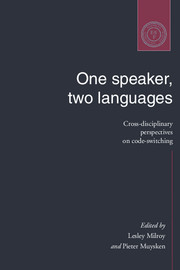Book contents
- Frontmatter
- Contents
- Notes on contributors
- Acknowledgments
- 1 Introduction: code-switching and bilingualism research
- Part one Code-switching in institutional and community settings
- Part two Code-switching and social life
- 6 The pragmatics of code-switching: a sequential approach
- 7 A social network approach to code-switching: the example of a bilingual community in Britain
- 8 Code-switching and the politics of language
- Part three Grammatical constraints on code-switching
- Part four Code-switching in bilingual development and processing
- Index
6 - The pragmatics of code-switching: a sequential approach
Published online by Cambridge University Press: 05 June 2012
- Frontmatter
- Contents
- Notes on contributors
- Acknowledgments
- 1 Introduction: code-switching and bilingualism research
- Part one Code-switching in institutional and community settings
- Part two Code-switching and social life
- 6 The pragmatics of code-switching: a sequential approach
- 7 A social network approach to code-switching: the example of a bilingual community in Britain
- 8 Code-switching and the politics of language
- Part three Grammatical constraints on code-switching
- Part four Code-switching in bilingual development and processing
- Index
Summary
Introduction
This paper will deal with code-switching in a specific sense. The perspective I want to take is an important one, but it does not exclude others.
Bilingualism (including multilingualism) is often thought of as multiple linguistic competences, i.e., as a mental disposition which is accessible only indirectly by the usual techniques of psycholinguistic research. In the mentalistic framework of generative grammar, bilingual competence is also accessible via the analysis of well-formed sentences involving two languages which may be treated as a window on the bilingual mind. Yet both the psycholinguist and the generative grammarian treat bilingualism as something which – like competence in general – is basically hidden underneath the skull and therefore invisible; it can be, and must be, made visible by psycholinguistic methods, or the methods of generative grammatical research. Beginning with the discussion of compound vs coordinate bilingualism in its psycholinguistic reformulation (see chapter 12, this volume), and up to the present generative work on grammatical constraints on code-switching (see chapter 9, this volume), there is an impressive amount of research which has been gathered from such a perspective.
Contrary to this tradition of research, I will be dealing here with bilingualism from the perspective of the conversationalist. For him or her, it has its foremost reality in the interactive exchanges between the members of a bilingual speech community (as well as between them and monolingual outsiders), by which they display to each other, and ascribe to each other, their bilingualism.
Information
- Type
- Chapter
- Information
- One Speaker, Two LanguagesCross-Disciplinary Perspectives on Code-Switching, pp. 115 - 135Publisher: Cambridge University PressPrint publication year: 1995
Accessibility standard: Unknown
- 195
- Cited by
